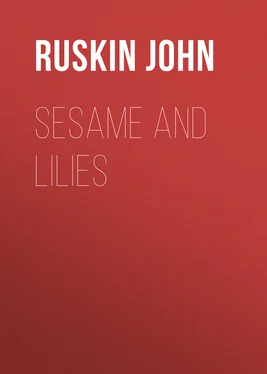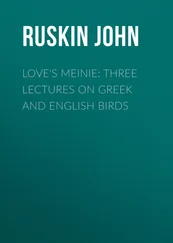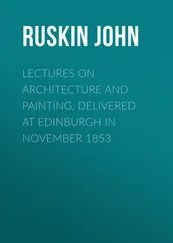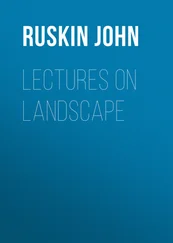John Ruskin - Sesame and Lilies
Здесь есть возможность читать онлайн «John Ruskin - Sesame and Lilies» — ознакомительный отрывок электронной книги совершенно бесплатно, а после прочтения отрывка купить полную версию. В некоторых случаях можно слушать аудио, скачать через торрент в формате fb2 и присутствует краткое содержание. Жанр: foreign_prose, literature_19, foreign_antique, на английском языке. Описание произведения, (предисловие) а так же отзывы посетителей доступны на портале библиотеки ЛибКат.
- Название:Sesame and Lilies
- Автор:
- Жанр:
- Год:неизвестен
- ISBN:нет данных
- Рейтинг книги:3 / 5. Голосов: 1
-
Избранное:Добавить в избранное
- Отзывы:
-
Ваша оценка:
- 60
- 1
- 2
- 3
- 4
- 5
Sesame and Lilies: краткое содержание, описание и аннотация
Предлагаем к чтению аннотацию, описание, краткое содержание или предисловие (зависит от того, что написал сам автор книги «Sesame and Lilies»). Если вы не нашли необходимую информацию о книге — напишите в комментариях, мы постараемся отыскать её.
Sesame and Lilies — читать онлайн ознакомительный отрывок
Ниже представлен текст книги, разбитый по страницам. Система сохранения места последней прочитанной страницы, позволяет с удобством читать онлайн бесплатно книгу «Sesame and Lilies», без необходимости каждый раз заново искать на чём Вы остановились. Поставьте закладку, и сможете в любой момент перейти на страницу, на которой закончили чтение.
Интервал:
Закладка:
"The place you desire," and the place you FIT YOURSELF FOR, I must also say; because, observe, this court of the past differs from all living aristocracy in this:– it is open to labour and to merit, but to nothing else. No wealth will bribe, no name overawe, no artifice deceive, the guardian of those Elysian gates. In the deep sense, no vile or vulgar person ever enters there. At the portieres of that silent Faubourg St. Germain, there is but brief question:– "Do you deserve to enter? Pass. Do you ask to be the companion of nobles? Make yourself noble, and you shall be. Do you long for the conversation of the wise? Learn to understand it, and you shall hear it. But on other terms?—no. If you will not rise to us, we cannot stoop to you. The living lord may assume courtesy, the living philosopher explain his thought to you with considerate pain; but here we neither feign nor interpret; you must rise to the level of our thoughts if you would be gladdened by them, and share our feelings, if you would recognise our presence."
This, then, is what you have to do, and I admit that it is much.
You must, in a word, love these people, if you are to be among them.
No ambition is of any use. They scorn your ambition. You must love them, and show your love in these two following ways.
(1) First, by a true desire to be taught by them, and to enter into their thoughts. To enter into theirs, observe; not to find your own expressed by them. If the person who wrote the book is not wiser than you, you need not read it; if he be, he will think differently from you in many respects.
(2) Very ready we are to say of a book, "How good this is—that's exactly what I think!" But the right feeling is, "How strange that is! I never thought of that before, and yet I see it is true; or if I do not now, I hope I shall, some day." But whether thus submissively or not, at least be sure that you go to the author to get at HIS meaning, not to find yours. Judge it afterwards if you think yourself qualified to do so; but ascertain it first. And be sure, also, if the author is worth anything, that you will not get at his meaning all at once;—nay, that at his whole meaning you will not for a long time arrive in any wise. Not that he does not say what he means, and in strong words too; but he cannot say it all; and what is more strange, will not, but in a hidden way and in parables, in order that he may be sure you want it. I cannot quite see the reason of this, nor analyse that cruel reticence in the breasts of wise men which makes them always hide their deeper thought. They do not give it you by way of help, but of reward; and will make themselves sure that you deserve it before they allow you to reach it. But it is the same with the physical type of wisdom, gold. There seems, to you and me, no reason why the electric forces of the earth should not carry whatever there is of gold within it at once to the mountain tops, so that kings and people might know that all the gold they could get was there; and without any trouble of digging, or anxiety, or chance, or waste of time, cut it away, and coin as much as they needed. But Nature does not manage it so. She puts it in little fissures in the earth, nobody knows where: you may dig long and find none; you must dig painfully to find any.
And it is just the same with men's best wisdom. When you come to a good book, you must ask yourself, "Am I inclined to work as an Australian miner would? Are my pickaxes and shovels in good order, and am I in good trim myself, my sleeves well up to the elbow, and my breath good, and my temper?" And, keeping the figure a little longer, even at cost of tiresomeness, for it is a thoroughly useful one, the metal you are in search of being the author's mind or meaning, his words are as the rock which you have to crush and smelt in order to get at it. And your pickaxes are your own care, wit, and learning; your smelting furnace is your own thoughtful soul. Do not hope to get at any good author's meaning without those tools and that fire; often you will need sharpest, finest chiselling, and patientest fusing, before you can gather one grain of the metal.
And, therefore, first of all, I tell you earnestly and authoritatively (I KNOW I am right in this), you must get into the habit of looking intensely at words, and assuring yourself of their meaning, syllable by syllable—nay, letter by letter. For though it is only by reason of the opposition of letters in the function of signs, to sounds in the function of signs, that the study of books is called "literature," and that a man versed in it is called, by the consent of nations, a man of letters instead of a man of books, or of words, you may yet connect with that accidental nomenclature this real fact:– that you might read all the books in the British Museum (if you could live long enough), and remain an utterly "illiterate," uneducated person; but that if you read ten pages of a good book, letter by letter,—that is to say, with real accuracy,– you are for evermore in some measure an educated person. The entire difference between education and non-education (as regards the merely intellectual part of it), consists in this accuracy. A well- educated gentleman may not know many languages,—may not be able to speak any but his own,—may have read very few books. But whatever language he knows, he knows precisely; whatever word he pronounces, he pronounces rightly; above all, he is learned in the PEERAGE of words; knows the words of true descent and ancient blood, at a glance, from words of modern canaille; remembers all their ancestry, their intermarriages, distant relationships, and the extent to which they were admitted, and offices they held, among the national noblesse of words at any time, and in any country. But an uneducated person may know, by memory, many languages, and talk them all, and yet truly know not a word of any,—not a word even of his own. An ordinarily clever and sensible seaman will be able to make his way ashore at most ports; yet he has only to speak a sentence of any language to be known for an illiterate person: so also the accent, or turn of expression of a single sentence, will at once mark a scholar. And this is so strongly felt, so conclusively admitted, by educated persons, that a false accent or a mistaken syllable is enough, in the parliament of any civilized nation, to assign to a man a certain degree of inferior standing for ever.
And this is right; but it is a pity that the accuracy insisted on is not greater, and required to a serious purpose. It is right that a false Latin quantity should excite a smile in the House of Commons; but it is wrong that a false English MEANING should NOT excite a frown there. Let the accent of words be watched; and closely: let their meaning be watched more closely still, and fewer will do the work. A few words well chosen, and distinguished, will do work that a thousand cannot, when every one is acting, equivocally, in the function of another. Yes; and words, if they are not watched, will do deadly work sometimes. There are masked words droning and skulking about us in Europe just now,—(there never were so many, owing to the spread of a shallow, blotching, blundering, infectious "information," or rather deformation, everywhere, and to the teaching of catechisms and phrases at school instead of human meanings)—there are masked words abroad, I say, which nobody understands, but which everybody uses, and most people will also fight for, live for, or even die for, fancying they mean this or that, or the other, of things dear to them: for such words wear chameleon cloaks—"ground-lion" cloaks, of the colour of the ground of any man's fancy: on that ground they lie in wait, and rend them with a spring from it. There never were creatures of prey so mischievous, never diplomatists so cunning, never poisoners so deadly, as these masked words; they are the unjust stewards of all men's ideas: whatever fancy or favourite instinct a man most cherishes, he gives to his favourite masked word to take care of for him; the word at last comes to have an infinite power over him,—you cannot get at him but by its ministry.
Читать дальшеИнтервал:
Закладка:
Похожие книги на «Sesame and Lilies»
Представляем Вашему вниманию похожие книги на «Sesame and Lilies» списком для выбора. Мы отобрали схожую по названию и смыслу литературу в надежде предоставить читателям больше вариантов отыскать новые, интересные, ещё непрочитанные произведения.
Обсуждение, отзывы о книге «Sesame and Lilies» и просто собственные мнения читателей. Оставьте ваши комментарии, напишите, что Вы думаете о произведении, его смысле или главных героях. Укажите что конкретно понравилось, а что нет, и почему Вы так считаете.












